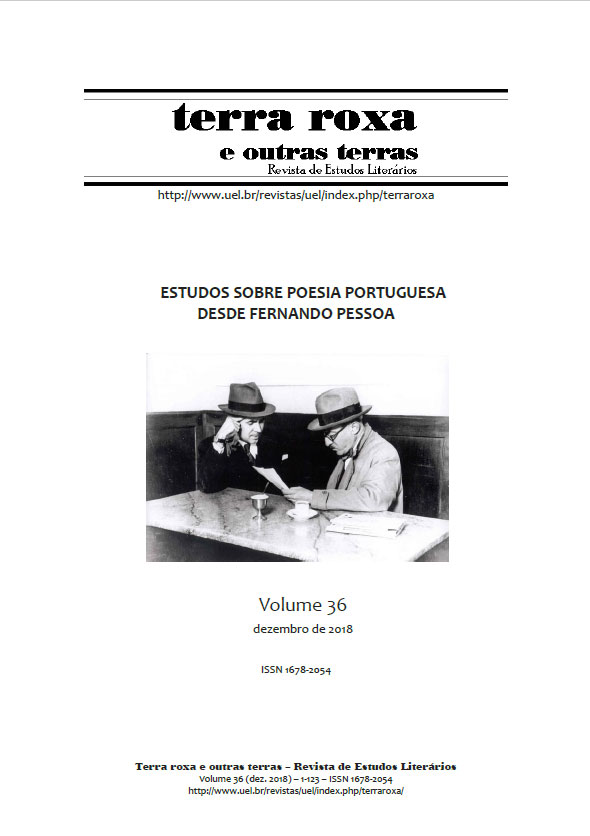Groping poetry, today, aesthetics, democracy: a conversation with Sousa Dias
DOI:
https://doi.org/10.5433/1678-2054.2018v36p31Keywords:
Sousa Dias, Poetry, Aesthetics, DemocracyAbstract
Poetry is an idea that cannot be pronounced without open a territory of vast and problematic senses. Thinking of it, at a certain historical moment and in a certain place, it is a task that slips between aesthetics and politics. In Portugal, contemporaneously, one of the keenest thinkers among those who reflect on poetry, and art in general, is Sousa Dias. In texts such as “Poesia, arte bilingue” and “A experiência poética”, Sousa Dias is a prolific interlocutor for subjects that are of great interest to this essay, such as the possibility of, in the universe where we can conventionally name the word poetry, deserarchization and democracy building. It becomes inevitable to reflect, then, on the relation between aesthetics and ethics and on what can be considered a content colonization in times of excessive communication. To this reflection, besides Sousa Dias, other thinkers and critics will be invited to expose their voices, as well as poets, of course.Downloads
References
BELO, Ruy. Na senda da poesia. Maria Jorge Vilar de Figueiredo (org.). Lisboa: Assírio & Alvim, 2002.
CAMÕES, Luís de. Os Lusíadas. Emanuel Paulo Ramos (ed.). Porto: Porto, 1978.
CRUZ, Gastão. Os poemas. Lisboa: Assírio & Alvim, 2009.
DELEUZE, Gilles; GUATTARI, Félix. Kafka – por uma literatura menor. Trad. Cíntia Vieira da Silva. Belo Horizonte: Autêntica, 2014.
DIAS, Sousa. A experiência poética. O que é poesia? Lisboa: Documenta, 2014. pp. 31-39.
DIAS, Sousa. A metáfora para lá da metáfora. O que é poesia? Op. cit. pp. 49-70.
DIAS, Sousa. Poesia, arte bilingue. O que é poesia? Op. cit. pp. 11-29.
DIAS, Sousa. Pré-Apocalypse now – diálogo com Maria João Cantinho sobre política, estética e filosofia. Lisboa: Documenta, 2016.
LERNER, Ben. Ódio à poesia. Trad. Daniel Jonas. Amadora: Elsinore, 2016.
MAFFEI, Luis. Dois ou três possíveis para a poesia brasileira. Zunái. v. 3, n. 1, junho 2016. Disponível em: http://zunai.com.br/post/145779495408/perisc%C3%B3pio-2-dois-ou-tr%C3%AAs-poss%C3%ADveis-para-a.
NANCY, Jean-Luc. Resistência da poesia. Trad. Bruno Duarte. Lisboa: Vendaval, 2005.
SALLES, Luciana. Inspecionando as chagas uns dos outros: diálogo e testemunho em Jorge de Sena. Ler Jorge de Sena. Disponível em http://www.lerjorgedesena.letras.ufrj.br/ressonancias/pesquisa/ufrj/3-inspecionando-as-chagas-uns-dos-outros-dialogo-e-testemunho-em-jorge-de-sena/.
SENA, Jorge de. Poesia 1. Jorge Fazenda Lourenço (ed.). Lisboa: Guimarães, 2013.
Downloads
Published
How to Cite
Issue
Section
License
Copyright (c) 2019 Terra Roxa e Outras Terras: Revista de Estudos Literários

This work is licensed under a Creative Commons Attribution 4.0 International License.
Authors who publish in this journal agree to the following terms:
a) The authors retain the copyright and grant the journal the right of first publication, the work being simultaneously licensed under the Creative Commons Attribution-NonCommercial 4.0 International License, allowing the sharing of the work with acknowledgment of the authorship of the work and initial publication in this journal.
b) Authors are authorized to assume additional contracts separately, for non-exclusive distribution of the version of the work published in this journal (eg, publish in an institutional repository or as a book chapter), with acknowledgment of authorship and initial publication in this journal.
c) Authors are allowed and encouraged to publish and distribute their work online (e.g. in institutional repositories or on their personal page) after the editorial process, as this can generate productive changes as well as increase impact and citation of the published work (See The Effect of Open Access).
d) The authors of the approved works authorize the journal to, after publication, transfer their content for reproduction in content indexers, virtual libraries and the like.
e) The authors assume that the texts submitted for publication are of their original creation, taking full responsibility for their content in case of any objection by third parties.



















